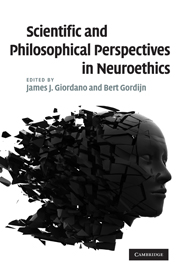Book contents
- Frontmatter
- Contents
- List of contributors
- Preface
- Acknowledgments
- Introduction
- 1 Developments in neuroscience
- 2 The origins of the modern concept of “neuroscience”
- 3 On the cusp
- 4 The mind-body issue
- 5 Personal identity and the nature of the self
- 6 Religious issues and the question of moral autonomy
- 7 Toward a cognitive neurobiology of the moral virtues
- 8 From a neurophilosophy of pain to a neuroethics of pain care
- 9 Transplantation and xenotransplantation
- 10 Neurogenetics and ethics
- 11 Neuroimaging
- 12 Can we read minds?
- 13 Possibilities, limits, and implications of brain-computer interfacing technologies
- 14 Neural engineering
- 15 Neurotechnology as a public good
- 16 Globalization: pluralist concerns and contexts
- 17 The human condition and strivings to flourish
- 18 The limits of neuro-talk
- Afterword
- Index
6 - Religious issues and the question of moral autonomy
Published online by Cambridge University Press: 07 May 2010
- Frontmatter
- Contents
- List of contributors
- Preface
- Acknowledgments
- Introduction
- 1 Developments in neuroscience
- 2 The origins of the modern concept of “neuroscience”
- 3 On the cusp
- 4 The mind-body issue
- 5 Personal identity and the nature of the self
- 6 Religious issues and the question of moral autonomy
- 7 Toward a cognitive neurobiology of the moral virtues
- 8 From a neurophilosophy of pain to a neuroethics of pain care
- 9 Transplantation and xenotransplantation
- 10 Neurogenetics and ethics
- 11 Neuroimaging
- 12 Can we read minds?
- 13 Possibilities, limits, and implications of brain-computer interfacing technologies
- 14 Neural engineering
- 15 Neurotechnology as a public good
- 16 Globalization: pluralist concerns and contexts
- 17 The human condition and strivings to flourish
- 18 The limits of neuro-talk
- Afterword
- Index
Summary
AUTONOMY: A BRIEF HISTORY OF THE CONCEPT
No other concept has played such a decisive role in the history of ethical thought as that of autonomy. It reached maturation in modern moral philosophy, within a theory of the ethical subject, but in fact autonomy has a much longer history. Its origins can be traced to the culture of classical antiquity, which made use of the concept in a paradigm of thought distinct from that existing today. The approach was primarily of a political character in that the concept of autonomy served to characterize the nature and identity of sociopolitical entities (e.g. cities), which, albeit maintaining their relationship to the state (Athens) and recognizing its primacy, claimed their independence and the right to enact their own laws (Thucydides and Herodotus).
Later, in the European context of the seventeenth century wars of religion, the concept of autonomy returned in the form of a legal-political notion. It affirmed the ability of every individual to exercise his right to freedom of religion and conscience. Moreover, the social aspect of autonomy was claimed as a condition for the existence and development of single spheres of individual and collective life, within the community of states. As the modern idea of state developed in Europe, the concept of autonomy accompanied the history of emancipation and the liberation of individual life from the arrogant and destructive supremacy of dictatorial notions in politics as in social life.
- Type
- Chapter
- Information
- Scientific and Philosophical Perspectives in Neuroethics , pp. 134 - 145Publisher: Cambridge University PressPrint publication year: 2010



